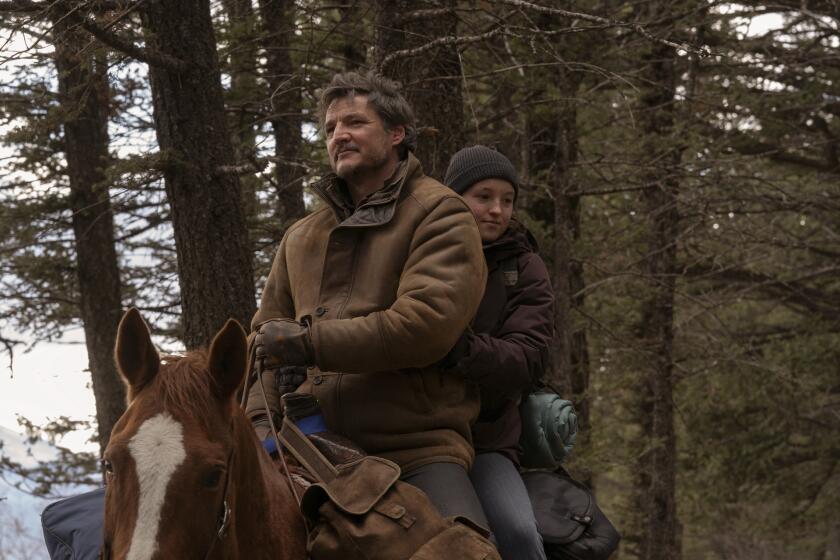A ‘Christmas Oratorio’ Fit for Bach
- Share via
Christopher Hogwood--as all but those still living in the performance practice Dark Ages will know--is a conductor of scholarly perspective as well as musical authority. The founder of the Academy of Ancient Music ensemble specializes in performances of Baroque and Classical music on period instruments, or reasonable facsimiles thereof.
This week, however, he begins performances at the Music Center of Bach’s “Christmas Oratorio” with the Los Angeles Philharmonic and Los Angeles Master Chorale, neither of which are pillars of the early music establishment.
Hogwood does not see any great compromise involved in that, feeling that such performances can be made within the spirit if not the letter of Bachian practice.
“I think it certainly does not misrepresent Bach,” he says, adding “I think in an ideal world you would want to perform it with exactly the same forces, in exactly the same hall, under exactly the same conditions, as Bach did.”
The Philharmonic and Master Chorale will be much reduced in size, of course, and Hogwood believes that is one starting point in preserving Baroque spirit.
“I think you have to balance out chorus, soloists and instrumentalists in the hall. . . . What to preserve is proportion.”
Hogwood conducting Bach will not be new to Philharmonic subscribers. The British conductor opened the Philharmonic’s 1984-85 season, in the interregnum between Giulini and Previn, leading essentially the same forces in Bach’s B-minor Mass.
Those musicians included bass David Thomas--a member of what Hogwood calls the “house team” at the Academy of Ancient Music--and soprano Mary Rawcliffe, who is replacing Emma Kirkby because the latter is having a baby. Mezzo Catherine Robbin and tenor Laurence Dale complete the “Christmas Oratorio” vocal soloists.
His experiences with the B-minor Mass and other Philharmonic performances have given Hogwood confidence about the approaching “Christmas Oratorio.” “It just shows what a flexible orchestra the Phlharmonic has become,” he says, referring to the orchestra’s ability to adapt to different stylistic criteria.
The “Christmas Oratorio” is actually a gathering of six cantatas centering on Christmas and Epiphany. The first three cantatas will be given this week on Tuesday, Thursday, Friday and next Sunday. The second half of the oratorio is scheduled for Dec. 16 and 19. (See music listings on Page 66 for times.)
PREMIERES AND DEBUTS: The world premiere of Charles Wuorinen’s only opera, “The W. of Babylon,” takes place Dec. 18 in a concert performance at the Herbst Theatre in San Francisco. A similar performance there preceded the Houston opening of “Nixon in China,” by John Adams, who preceded Wuorinen as composer-in-residence with the San Francisco Symphony.
Performance artist Rachel Rosenthal presents the Los Angeles premiere of “L.O.W. in Gaia” as a fund-raiser for the Cactus Foundation. Four performances are planned for this week, Thursday through Sunday. Information: (213) 839-0661.
Yoav Talmi, music director of the Israel Chamber Orchestra, makes his debut with the Los Angeles Chamber Orchestra, Thursday and Saturday. His program lists Hindemith’s “Kammermusik No. 1,” Beethoven’s Second Symphony, and Schumann’s Cello Concerto, with soloist Ralph Kirshbaum.
The Eastman Brass offer the local premiere of the “Christmas Concerto” by John Harbison, the Pulitzer Prize winning composer-in-residence with the Los Angeles Philharmonic, next Sunday. The Chamber Music Music in Historic Sites concert takes place at the Saint Vincent de Paul Church downtown.
NEW USC MUSIC FUND: The School of Music at USC has received $100,000 from Therese Kerze Cheyovich and Florence Kerze, to establish a fund in the name of their brother, chemical engineer Frank Kerze Jr. The first project supported by that gift has been the commissioning of a cello concerto by composer Karel Husa. The premiere will be given next fall by cellist Lynn Harrell and the USC Symphony.
More to Read
The biggest entertainment stories
Get our big stories about Hollywood, film, television, music, arts, culture and more right in your inbox as soon as they publish.
You may occasionally receive promotional content from the Los Angeles Times.










